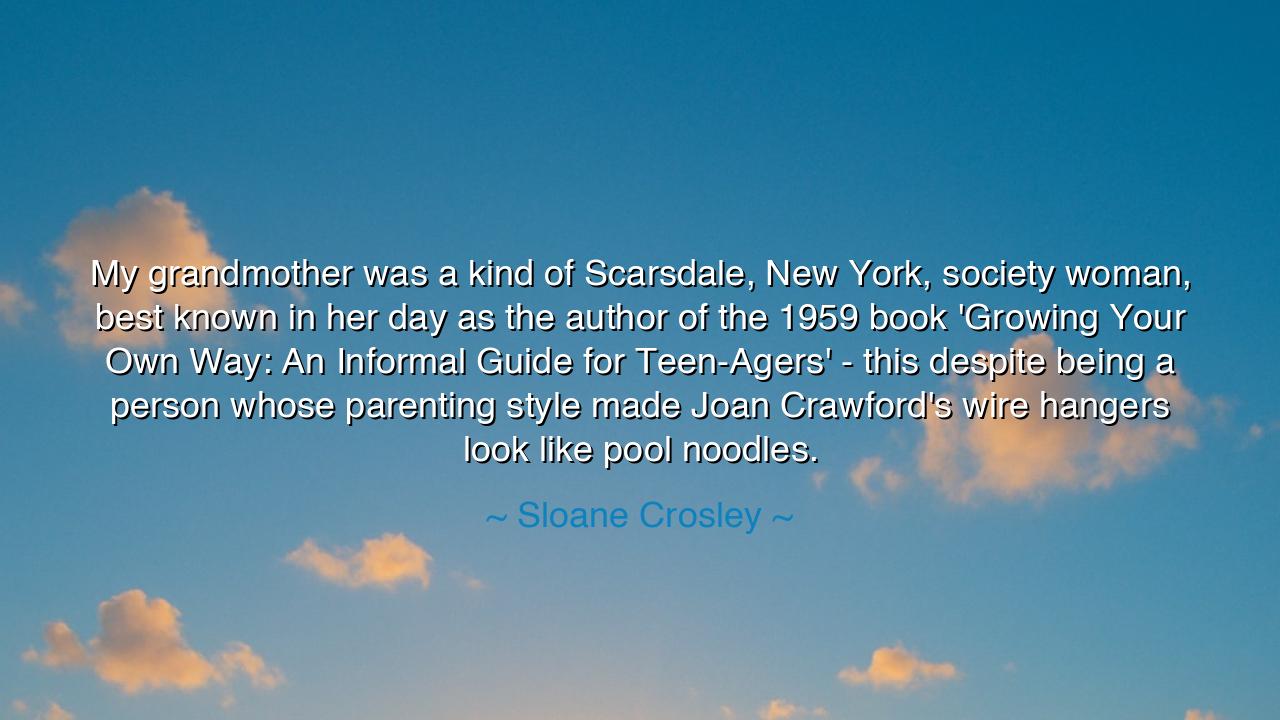
My grandmother was a kind of Scarsdale, New York, society woman
My grandmother was a kind of Scarsdale, New York, society woman, best known in her day as the author of the 1959 book 'Growing Your Own Way: An Informal Guide for Teen-Agers' - this despite being a person whose parenting style made Joan Crawford's wire hangers look like pool noodles.






In the words of Sloane Crosley, we encounter both sharp wit and piercing truth: “My grandmother was a kind of Scarsdale, New York, society woman, best known in her day as the author of the 1959 book Growing Your Own Way: An Informal Guide for Teen-Agers—this despite being a person whose parenting style made Joan Crawford’s wire hangers look like pool noodles.” Beneath the humor lies an ancient lesson: that the image a person presents to the world often stands in stark contrast to the reality within their own household. It is a reminder that wisdom written in books or spoken in public counts for little if it is not lived faithfully in the hidden places of the home.
The ancients warned us against this double face. In the Gospel we hear of the Pharisees, who taught virtue loudly in the streets but failed to practice it in truth. The Stoics, too, urged that philosophy must not remain in words, but be embodied in life. Crosley’s grandmother, famed for instructing the youth on how to “grow their own way,” embodied a paradox: she was praised in society for her guidance, even while her own parenting was remembered as harsh, cold, and unyielding. This dissonance becomes the heart of the lesson—authority without compassion is brittle, and knowledge without kindness is hollow.
History echoes this warning. Consider King Philip II of Spain, who sought to shape his empire with strict laws and rigid order, believing discipline alone could create greatness. Yet within his family, his severe and unbending parenting style bred fear rather than loyalty, obedience rather than love. His children fulfilled their roles, but their lives were marked by sorrow and silence. Contrast this with Marcus Aurelius, the philosopher-emperor, who wrote his Meditations not for others, but as reminders to himself to live the virtues he taught. Where Philip’s severity isolated, Marcus’s humility inspired. Here, too, we see the eternal truth: authority without humanity breeds resentment, but authority tempered with kindness cultivates legacy.
Crosley’s sharp humor—comparing her grandmother’s severity to Joan Crawford’s infamous cruelty—reminds us that children do not remember public honor, but private tenderness. A parent may be praised in society, may publish books, may lead others, but if the home is marked by fear and harshness, the child’s heart carries those scars far longer than the echoes of applause. True greatness in parenting is measured not by what the world sees, but by the love a child remembers.
The meaning, then, is twofold: first, we must be wary of hypocrisy, teaching others what we do not embody ourselves; second, we must remember that kindness is the core of all guidance. A book may guide a teenager, but a parent’s compassion guides a soul. The irony of Crosley’s story is sharp—but it is also instructive. It reveals how easy it is for society to celebrate the appearance of wisdom while overlooking the absence of love.
What, then, must we do? First, let us strive for integrity, ensuring that the lessons we offer in public match the example we live at home. Second, let us temper discipline with compassion, remembering that children are not clay to be beaten into shape, but gardens to be tended with patience. Third, let us measure success in parenting not by reputation or publication, but by the enduring warmth we leave in the hearts of those we raise.
O seekers of wisdom, remember this: books will fade, reputations will crumble, but the memory of kindness—or cruelty—endures for generations. Let us not be as those who speak of freedom while sowing chains at home. Let us, instead, embody the words we proclaim, so that our children may grow not in fear, but in love.
Thus, from Sloane Crosley’s bittersweet reflection we draw this lesson: to guide others truly, one must first live truly. To shape children with both honesty and kindness is greater than any honor bestowed by society. And so the teaching endures—be not remembered for the words you wrote, but for the love you lived.






AAdministratorAdministrator
Welcome, honored guests. Please leave a comment, we will respond soon